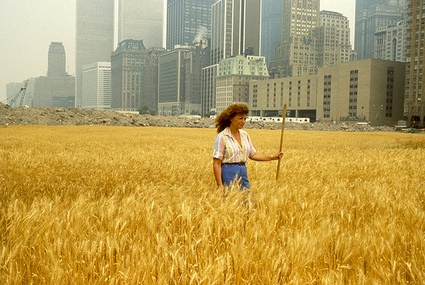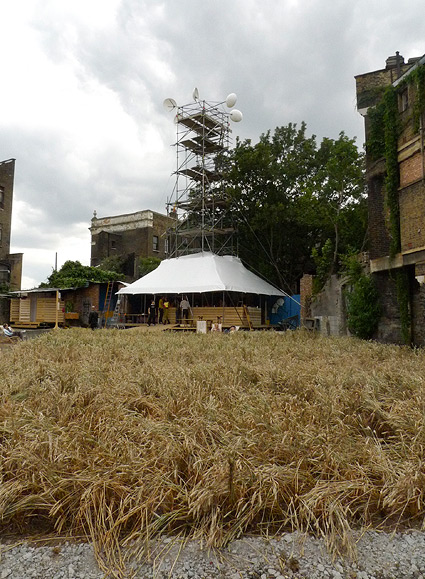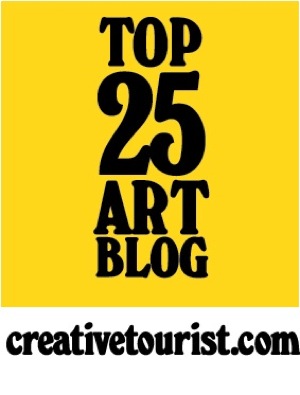 I've recently been to check out The Dalston Mill and Wheatfield – A Confrontation: two new offsite commissions as part of the Barbican Art Gallery’s current exhibition, Radical Nature – Art and Architecture for a Changing Planet 1969-2009.
I've recently been to check out The Dalston Mill and Wheatfield – A Confrontation: two new offsite commissions as part of the Barbican Art Gallery’s current exhibition, Radical Nature – Art and Architecture for a Changing Planet 1969-2009.The Dalston Mill is the brainchild of experimental architectural collective EXYZT, who have transformed a disused railway line and area of wasteland just off Dalston lane into a ‘rural retreat’ in the heart of the city, intended for the use of the local community.
The fully-functioning but temporary 16 metre mill on the site is accompanied by a 20 metre long wheat field, intended as a restaging of environmental artist Agnes Denes’ pioneering 1982 work Wheatfield – a Confrontation (see above). For the original piece, Denes planted and harvested two acres of wheat in Battery Park landfill in New York, situated between the Statue of Liberty and the World Trade Centre. The restaging of this work may be less radical (and is certainly a lot smaller) than the original work, but it’s still thought-provoking to experience this small corner of rural nature in the midst of a hectic urban environment. What’s more, the work raises some interesting issues about land use and ownership, autonomy, community, economy and sustainability at local level: the idea is that the mill will be processing grains from the field when the wheat is ready to be harvested. The resulting flour will then be baked into bread - transforming urban wasteland into a functional community space.

When we arrived at the site, on a reasonably sunny Saturday afternoon, the Mill was already buzzing with activity. People in deckchairs by the wheatfield enjoyed cold beers from the bar; small children pranced on a stage strung with fairy-lights; a cluster of people were gathered for a demonstration of the pedal-powered mill; and we were immediately invited to join in a free bread-making workshop with artisan baker Dan Lepard.
The purpose of the workshop was in fact to bake not loaves of bread, but a unique bread-based currency: The Dalston Slice, a bread coin that is being baked and sold only at the Dalston Mill. The coin can be redeemed for goods or services with local traders and producers who have agreed to be part of this alternative currency experiment, ranging from the Arcola Theatre to the Trendsetters Hair Salon to London Fields Cycles. After spending an enjoyable time making the bread ‘coins’ we were each rewarded with some currency: we chose to take our handmade coins along to the Dalston Superstore to exchange them for a slice of cake apiece.
It's lovely to see this patch of unloved wasteland reinvigorated as a lively community space: throughout the Radical Nature exhibition, it will also be the setting for a whole programme of workshops, talks, performances and events ranging from cake decorating workshops to an in conversation event with the architects to African dancing to lectures on urban psychoanalysis. And as well as a thought-provoking use of disused land, it’s also quite simply a very pleasant place to while away a summer afternoon: a secret rural hideaway, tucked out of sight of the busy streets. Whether this site can truly act as a functional, independent shared space for the local community to use and enjoy, or whether it will rather work as simply another community arts venture, largely of interest to existing arts audiences rather than making a significant impact on the local communities it seeks to engage, is debatable: however, there’s no doubt it’s a step in the right direction.
The Dalston Mill and the Wheatfield are unfortunately only up for three weeks in total and will close on August 6th: definitely worth checking out while you can! Read some other responses to the works here and here.
[Photos via we make money not art: agnes denes' original wheatfield and the dalston mill re-creation]













0 comments:
Post a Comment